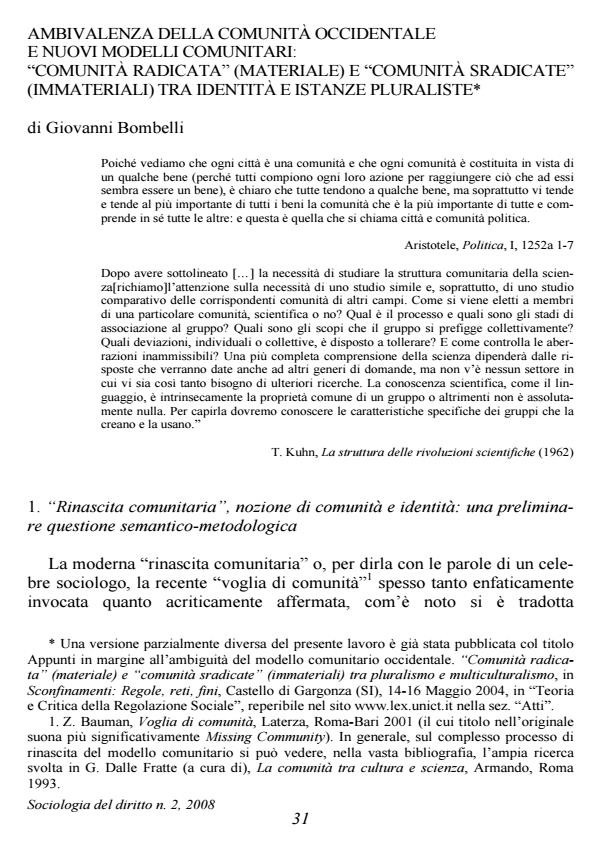Ambivalenza della comunità occidentale e nuovi modelli comunitari: "comunità radicata" (materiale) e "comunità sradicate" (immateriali) tra identità e istanze prulariste
Journal title SOCIOLOGIA DEL DIRITTO
Author/s Giovanni Bombelli
Publishing Year 2008 Issue 2008/2
Language Italian Pages 28 P. 31-58 File size 252 KB
DOI
DOI is like a bar code for intellectual property: to have more infomation
click here
Below, you can see the article first page
If you want to buy this article in PDF format, you can do it, following the instructions to buy download credits

FrancoAngeli is member of Publishers International Linking Association, Inc (PILA), a not-for-profit association which run the CrossRef service enabling links to and from online scholarly content.
The Ambivalence of the Western Community and New Models of Community: The Identities and Pluralist Approaches of the (Material)Rooted Community and of (Immaterial) Uprooted Comunities Starting from the recent return in sociology of law to considering the community to be the expression and the vehicle of individual and collective identity, this article identifies a gradual transition from the focus on the traditional Western communitas to the rise of new models of community. More generally, it questions what the substantial nucleus of the traditional conception of community actually was and what its current destiny is. From the Greek polis to the dawn of modernity, the Western notion of community has at least two essential features. On the one hand, it rests primarily on the category of rooting and, as such, can de defined as a rooted community (or a material one). On the other hand, it contains a structural dialectic ambivalence that oscillates between Utopia, Ideology and Dystopia. Models of community alternative to this are now taking shape, exemplified by two particularly significant typologies: the scientific community and the electronic- virtual community, whose methods of articulation are radically innovative and which can be classified, in contrast to the others, in terms of uprooted (or immaterial) communities. This cultural transition implies at least two essential effects: the potential overall reconfiguration of the classical Western model of community (in both sociolegal and anthropological-philosophical terms), which is often evoked in a process of instrumentalisation, and the rise of unprecedented historical and social scenarios in which the juxtaposition between identity and pluralism can be expected to be played out in the near future, both domestically and internationally.
Giovanni Bombelli, Ambivalenza della comunità occidentale e nuovi modelli comunitari: "comunità radicata" (materiale) e "comunità sradicate" (immateriali) tra identità e istanze prulariste in "SOCIOLOGIA DEL DIRITTO " 2/2008, pp 31-58, DOI: